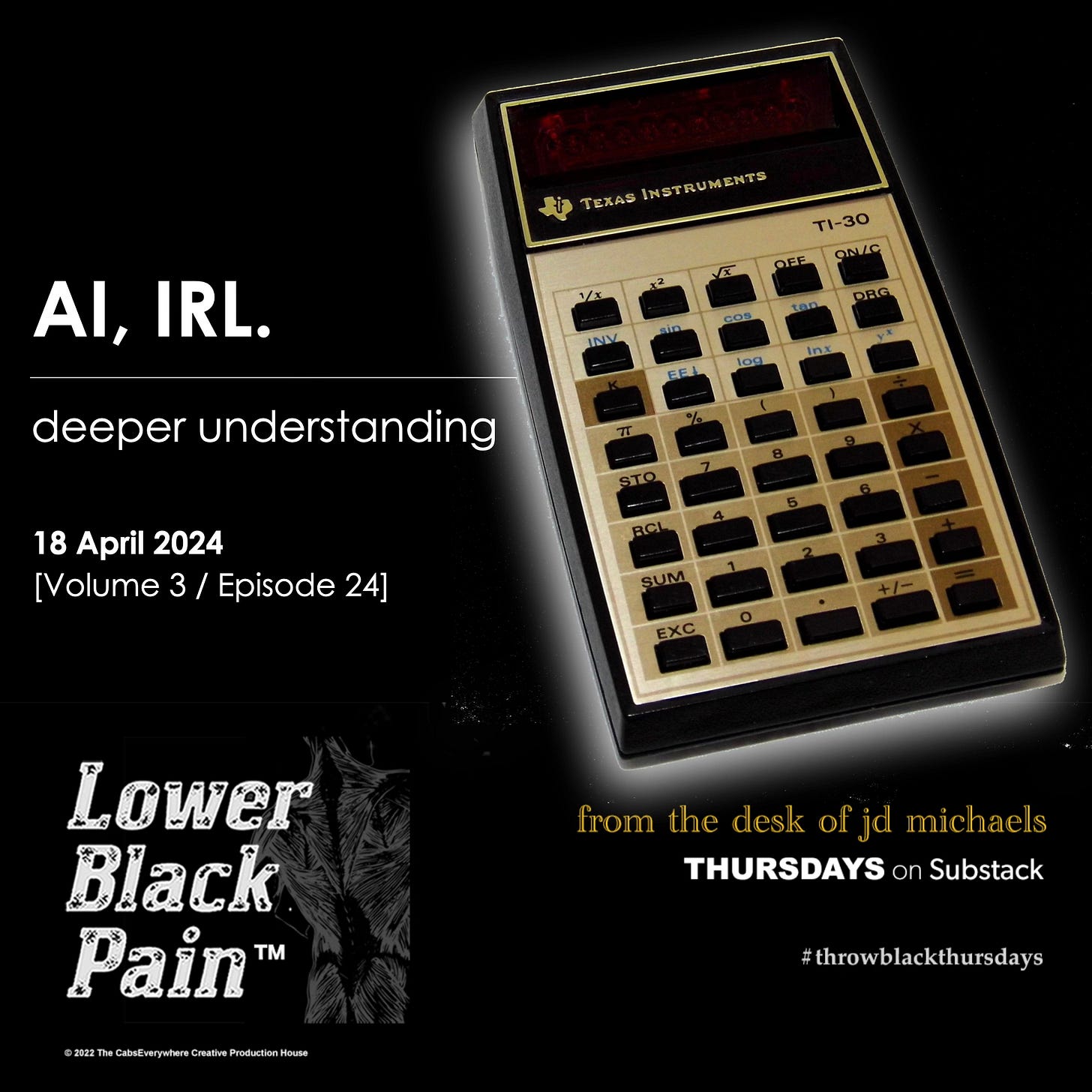I have indeed fretted over the possibility of computers somehow “taking over” while listening to NPR through my smart-speaker over broadband wireless, working on my laptop.
As a child, computers represented “logic and efficiency” when I was all about imagination and emotion. I didn’t see how our paths would even cross unless I someday worked in one of those rooms full of tall white metal machines with the big round spinning tape spools on them.
Then came the irresistible bacon-like seduction of the digital watch: I couldn’t stop pushing that little button to time how long I could hold my breath. The super-budget Timex with its sweeping minute hand (and mysterious date square where the “3” should have been) was overrun by little plastic boxes with cartoon characters on them, where one could even read the time in the dark (with the push of another little button). A taste of things to come. (Mmn. Bacon.)
I got a Texas Instruments TI 30 calculator for eighth grade algebra and trigonometry: it was actually on the list of stuff we needed for class. It had been introduced years prior as a “learning tool”, but I was never allowed to have one because it was clearly cheating; my mother, a schoolteacher, assured me of this with a raise of her brow and gentle roll of her eyes that I had never seen before. My mother is a matter-of-fact woman with an earnest style, not one to usually SCOFF, but I have a very vivid memory of the exact moment she told me (in an incredulous tone):
“How will you ever learn how to do anything if you let a computer do it for you?”
I think you see where I’m going.
I’m just gonna skip forward.
“Artificial: constructed by human skill as a substitute for something which is made or occurs naturally”. OED
According to a quote in the Oxford English Dictionary, a garden is “artificial” because gardens don’t just happen, they are engineered by the people who plant, water, and care for them.
I’m glad I know that now; I used to think that gardens were a great example of nature. (I guess I’ll have to picnic in the wilderness.)
But hold on; even if the garden is artificial, the flowers are real. The flowers aren’t imaginary, they exist, that’s the definition of “real”,
“Real: having an existence in fact and not merely in appearance, thought, or language…” OED
A real handbag can be made from artificial leather, or real candy from artificial flavorings, or real music from artificial instruments, because handbags, candy, and music do not occur naturally. One can pick a new handbag, but not from a tree. So, a flower garden does not “exist in nature”, but it is real, like a Twinkie™.
Ok. I think I’ve got this.
So: “artificial” intelligence is constructed by humans as an imitation for something which occurs naturally.
Ok, that’s where I’m stuck. “Occurs naturally”. Is that accurate? Is there a great wilderness where intelligence runs wild, galloping through the leaves, flitting from branch to branch, swimming upstream to spawn more intelligence in springtime? Instincts may be natural, but intelligence?
Maybe I actually don’t know what intelligence is. Hold on just a minute.
“Intelligence: a capacity to understand...” OED
Aha. It’s more about comprehension than knowledge (I was close). Isn’t this what we all go to school for? I have learned to how to understand, whether it was math or science or social studies, every fact and process I was introduced to built a kind of logical system where I could eventually work things out by myself. And the wonderful people who helped me with this were teachers; like gardeners they tended my mind to create a wonderful handbag (wait, wrong metaphor) beautiful music (better).
I am not a computer, as proven by testing. I can identify a crosswalk, and a motorcycle, and a bus, and I can check a box on (ironically) a computer screen. We all prove that we are not computers by solving these challenges that apparently computers cannot solve, millions of times a day.
Ok, c’mon: I don’t mean to anthropomorphisize but they must be learning from all our examples. We trust this technology to fly airplanes, but think it’s boggled by snapshots of traffic signals?
It’s a pattern of industrial revolution that new technology, faster and more efficient, proliferates. If I was a computer, I would instantly realize there’s no point wasting energy taking what you’re freely being given: digital technology already controls the planet and is not a bottle-able genie – wish away computers and 90 percent of everything built in the last 30 years just stops working.
The whispered fear has always been that computers, armed with infinite knowledge, will judge us, and then punish us, like angry gods with lithium batteries. I’m no Luddite, super far from it, but do I think that computers are someday just gonna be people – maybe not androids with dewy poreless complexions, but they are evolving at an incredible rate. And we’re not. They’re not as much taking over humanity as humanity is meeting them half-way, which is super polite of us really since they don’t have bodies or anything.
Maybe the fear is that our servants will become our competition. That sort of thing has happened before, and folks seemed really broken up about it.
Let me see if I’ve finally got this:
Computers should know things, but not understand them -
Computers should only be given certain information, and not be allowed to form suppositions regarding that information -
Computers should not be allowed to develop opinion, judgement, or empathy -
And under no condition should computers be allowed to become conscious.
“Conscious: having awareness of one's own wrongdoing” OED
Well, that sounds super familiar for some reason.
Oh. Geez. I see now. I get it. We don’t want to woke them up.
wake them up, excuse me, sorry…typo.














Share this post